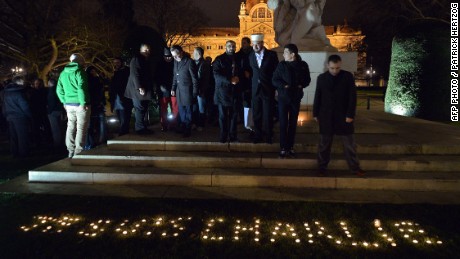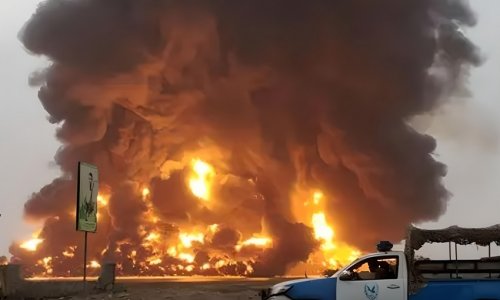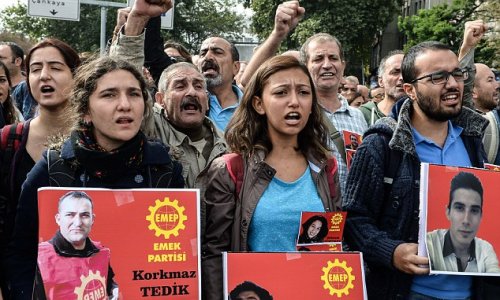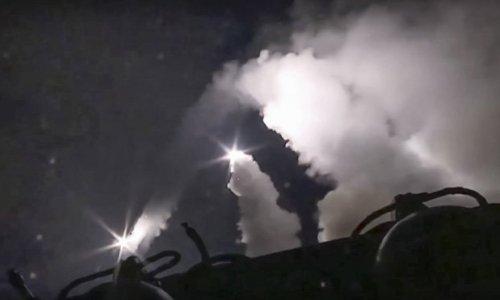What have you made of the response from French officials, and indeed other European nations, to the attack on the offices of Charlie Hebdo?
Cindy Storer: I think it's too soon to evaluate the French and broader European response to the attacks. But I'd like to address what I hope will come of this. We're hearing calls for increased intelligence cooperation and potentially "boots on the ground" in Iraq and Syria. Intelligence cooperation is always helpful, of course. But I doubt that any amount of increased government cooperation against terrorists will suffice to end the threat.
Terrorism ends when terrorists have no audience, and no new recruits. They become marginalized. That happens when the people whose needs they claim to represent are themselves no longer marginalized. It seems to me that having so many world leaders in Paris was an opportunity to make progress in building new relationships that bring people together. That may seem Pollyannaish, but I don't see any other way out of this.
Barak Barfi: I think France faces two challenges -- how to respond domestically to integrate Muslim minorities, in addition to decreasing Gaullist racism, and how to craft an international policy to confront radical Islam. Unfortunately for France, these policies are directly correlated. Every step Paris takes on the international stage by forcefully attacking al Qaeda and the Islamic State in Iraq and Syria will lead to domestic blowback and further Muslim alienation.
Moreover, France has become a British clone in that it largely toes America's Middle East line. In some cases, such as Iran, it's even holier than the Pope. Since the presidency of Nicolas Sarkozy, France has abandoned its anti-U.S./Israeli posture of the post-Charles de Gaulle era. It is actively involved in the anti-ISIS air campaign in Iraq. It was willing to attack Syria for its use of chemical weapons. There's very little more it can do to join the American camp.
If there is one area where France can better integrate, it's on intelligence. The U.S. and France have an uneasy relationship. Washington has historically been frustrated by Paris' corporate spying against American companies.
Sahar Aziz: To me, European government responses to the Paris attacks show that Western countries are unwilling to meaningfully address the root causes of terrorism arising out of the Middle East. Rather than examining why groups like ISIS and al Qaeda are able to recruit so many people from across the world, government officials appease public anger by calling for more aggressive anti-terrorism laws, which is basically code for selectively targeting Muslims within their countries.
Whether through stripping alleged terrorists of citizenship, censoring websites that are deemed to glorify terrorism, or sending informants to entrap Muslims into sting operations; these are merely reactive tactics that do not begin to address the much deeper underlying causes of the troubling spread of violent extremist views and practices within the Middle East.
Indeed, stripping citizens who are Muslim of civil liberties ultimately harms the entire nation's citizenry because history shows it is just a matter of time before those same laws are applied against other groups the government deems suspicious.
So when the French government meets with officials from the U.S., the U.K., Germany, and other Western nations to discuss how to better cooperate on combating terrorism, they would be well-advised to focus on the causes rather than the symptoms. Resources are better spent on assisting indigenous reformers in the Middle East, whether secular or Islamist, in their efforts to create more political space for freedom of speech, association, and expression
European nations must recognize that their support of authoritarian regimes in Egypt, Algeria, Morocco, and the Gulf states creates fertile environments for extremism that arises out of the brutality of those regimes. We can't keep separating a Western nation's foreign policies in the Middle East from its domestic national security.
The sooner we recognize that the freedom of Muslims in the Middle East affects our own freedoms in the West, the sooner we can begin to meaningfully address the root causes of global terrorism.
Shadi Hamid: I wish it were otherwise, but there's little reason to be optimistic -- the impressive and inspiring show of solidarity at the Paris unity march wasn't necessarily a sign of things to come. Thirteen years after September 11, the U.S. and its European allies are still struggling with the same basic set of questions. In fact, in many ways, we seem to be regressing. 2014 was the Muslim world's Salafi-Jihadi moment, where extremists made unprecedented gains in Syria, Iraq, Yemen, Nigeria and Libya. Terrorist groups are very difficult to fight for the simple reason that they draw strength from basic "flaws" in our democracies, flaws which are very difficult, if not impossible, to address.
Some ask why self-proclaimed defenders of the faith would commit acts that put Western Muslims at such great risk. Except that that's the point. The more European Muslims are shunned because of jihadist blowback, the more appealing radical messages become. Just as Islamist extremists benefit the far right, an emboldened French far right benefits Islamist extremists, allowing them to drive a greater wedge between Muslims and non-Muslims and feed their "clash of civilizations" narrative.
The al Qaeda playbook since 9/11 has been to provoke Western powers into doing things they otherwise wouldn't, to drag them into, as Michael Doran says, "somebody else's civil war." In this sense, the Iraq war was a godsend to al Qaeda. So, too, was Abu Ghraib. By dangerously overreacting and overreaching, we fell into a trap. And we will likely fall into another trap, and another trap after that. Europe's far right, which was already surging, will use the Paris attacks to advance its exclusionary agenda. More French citizens, out of fear, will find their message appealing.
The state has a role to play -- in calling for calm and promoting inclusive policies -- but it can only do so much. Among citizens, terrorism provokes a very natural reaction -- fear coupled with an overwhelming desire for security. But it's that very reaction that fuels the cycle of Muslim alienation. Democracies are particularly susceptible to this, because elected leaders, however well-intentioned, cannot afford to ignore public sentiment.
And in foreign policy, the U.S., France, Britain, and others are likely to double down on the narrow counterterrorism approach that has defined Western policy toward the Arab world in recent years.
Cindy Storer: I agree with all of your comments, and especially appreciate your take on Western public opinion and pressures it places on policymakers, Shadi. However, wherever you can identify a linchpin, you can also find opportunity. Public opinion is one of those linchpins, and it can turn.
Now, I'm not naive enough to think this is an easy or straightforward process. But we do know something about how movements are built and sustained. The Salafi jihadi movement has done this superbly, sadly. We (meaning everyone else) can do it too, but to do so, we have to go beyond the safe prediction that it will never happen because its too hard, and imagine how it might happen.
First, there must be a simple, powerful message that appeals to people on a fundamental, even atavistic, level. Then, the message must be disseminated to people where they live, so to speak. In the 1990s, the Islamic Awakening movement in Saudi Arabia distributed audiotapes and eventually videotapes, rather than relying on television or other mainstream media.
Now, movements use Twitter, Facebook, and such. Today, the kind of brave yet peaceful unity displayed in the rally in France draws on one such simple but powerful idea -- we are all one. "Je suis Charlie Hebdo...or Ahmad...or Jewish..." etc.
Next, it takes some degree of organization, and often private funding, to keep the message rolling. The jihadists formed groups and councils, backed by wealthy individuals, then created or took over charitable organizations, schools, and media centers to spread their message. Publishers in France rallied around Charlie Hebdo.
Eventually, movements can influence government in a variety of ways. Dictatorships are notoriously poor at listening to people, and in fact stifle public opinion that challenges the state in any way, so it's no surprise that what began as a fundamentalist movement in the Middle East evolved into violent revolution and eventually spawned terrorist groups. Democracies are designed to be better at responding to public opinion, as you noted, Shadi. Where there is freedom of speech and means to communicate, messages can reach a tipping point.
Is one rally in France enough? Of course not. But it did tap into something that many of us believe but are often not brave enough to say, that we are all one. There is strength in numbers. Perhaps, this movement can be sustained. It will be interesting to watch.
Shadi Hamid: Cindy, I really hope you're right. I wish I could be optimistic about this message of unity going viral, but I'm afraid I just can't muster it right now. "We are all one" is indeed a powerful message, but what does it actually mean, underneath the good sentiment and a kind of liberal faith that all people are essentially good and want the same things, regardless of culture, religion, and so on? Except we aren't all one.
In recent days, even if we limit our scope to Western liberals, there is a pretty striking lack of consensus about the limits of free speech, the need to restrict "hate speech," how we treat religions versus ethnicities, and the centrality of secularism to the Western liberal model.
Dov Alfon has written about how French teachers were dumbfounded that a significant number of Muslim students refused to stand up for a moment of silence after the Paris attacks. But this is where confusion has seeped into the debate. Even if we could be united, what would we be united about? What was the unity march really about? Ostensibly, it was about solidarity with France and among the French in the face of the Paris killings. But, apparently, many people also think it was about reaffirming the right to blaspheme or even a broader faith in a kind of sacred secularity. These aren't quite the same things.
I don't believe there's a cultural divide on the specific question of slaughter at Charlie Hebdo and to even suspect, as a starting point, that French Muslims might be okay with the mass slaughter of other French is, well, a bit troubling.
But beyond the killings, there is a cultural divide. Many more French Muslims than non-Muslims are likely to view blasphemy as unacceptable. It's problematic to view condemning the Paris killings and supporting the right to blaspheme as two sides of the same coin. For many Muslims in the Middle East, and many Muslims in France, they aren't.
Sahar Aziz: All thoughtful comments. But I'd like to take another angle to address the original question.
When addressing how France is reacting to the Charlie Hebdo attacks, I'm admittedly more concerned with their failure to prevent the attacks. Indeed, I'm dumbfounded as to how an intelligence community as experienced as France's, arising primarily from its brutal opposition to the Algerian independence movement and intervention in Algeria's bloody civil war, didn't discover the plot in the planning stages.
Neither assassin had a clean record or committed these atrocious acts with no warning. Indeed, both brothers were known to French security services, and one brother had spent time in jail for assisting in recruiting fighters to join militant groups in Iraq. So, where was French intelligence and law enforcement when the brothers reportedly purchased the automatic rifles, cased the newspaper's security system, and planned the details of the attacks?
How could they have missed such a devastating attack? In my opinion, either something is seriously broken in the French intelligence community or the security services were stretched too thin engaging in ineffective (not to mention illiberal) ethnic and religious profiling among France's population of over 5 million Muslims.
Whatever explains the breakdown in security, French citizens deserve answers.
Storer: Sahar, I have the same questions, but as a former practitioner, I'm not inclined to take an approach that looks for blame, but only for answers. Here in the U.S., we play the blame game all the time, which inevitably degenerates into a political "pissing contest," if you'll pardon the phrase, with the result that the public never gets the real answers and reforms never address some of the most important issues. There are so many parts to the system we call "intelligence" that it's a wonder our security agencies succeed as well as they do.
For example, it only takes one of several intelligence or police decision-makers or small groups on numerous levels to decide that someone is no longer a "threat" for that person to fall off surveillance. When intelligence and police services are stretched, prioritization must happen, and more people will cease to be monitored by police.
Now, analysts might very well continue to monitor a network including individuals who have fallen off the law enforcement radar, but analysts don't do surveillance or make arrests. They don't make decisions about resources, or interface with policymakers who have conflicting agendas. And if there's political and social pressure to avoid even the appearance of profiling, even if they aren't, that trickles down into intelligence and law enforcement policy.
So, there's no such thing as perfect security. You can sacrifice perfect short term security for long term peace, or long term peace for perfect short term security. Trying to have both leads to an ongoing ping pong match in which neither wins.
Sahar Aziz: Thanks, Cindy. I agree that playing the blame game is counterproductive, but I still believe it's worthwhile to determine what went wrong so that the same mistakes aren't made again in the future. Inherent in that process is determining whether it was an intelligence failure in the sense that accurate information about the true threat of these individuals didn't get to the appropriate law enforcement agents or whether it was a policy failure. That's a question worth answering, not only to avoid another tragic attack, but also to remind the government that it shouldn't respond to violence by simply spying and investigating more Muslims in France. That will only feed into the violent extremists narrative that the West is at war with Islam.
The French government should look into why French citizens choose to join extremist groups such as ISIS and al Qaeda. Similar to the U.S. anti-gang approaches, France should work with Muslim communities to address any underlying social issues that may cause young people to be more susceptible to joining extremist groups. The more meaningful opportunities that citizens have to obtain equal access to quality education, gainful employment, and fair treatment by their compatriots, the less likely they are to be lured into fanatical groups.
More importantly, they will be more integrated into mainstream French Muslim communities and mosques that can provide them with an accurate understanding of Islam rather than the warped and apocalyptic fallacies spread by ISIS, al Qaeda, and their ilk.
Barak Barfi: On your point Sahar, governments' knee-jerk reaction is to initially target Muslim communities. But over time, as they realize there's no quick fix, they must confront policies that have driven Muslims to embrace radicalism. It's at this time that their true dilemma stares them down -- they can't change societal views. Racism is so ingrained in Europe.
The reality is that no policies will be able to integrate Muslims into French society. They are not French, their cultural traditions are uniquely different and they live in segregated areas.
This doesn't mean that some don't break out of this paradigm. There are those who become ministers and confidants in the highest halls of power. However, as one who has lived in France and heard Muslim grievances, the average Muslim never breaks through. They are destined to a life on the margins of society.
The Chouaki brothers fit snuggly into the French Muslim paradigm -- petty criminals who could not succeed let alone integrate, they turn to a religion they never knew to find acceptance. They find a janitor cum preacher to guide them. This is not traditional Islam. Rather, it's Islam transplanted into modernity characterized by a Western ethos, one that struggles to provide answers to an ever encroaching culture.
Shadi Hamid: Barak, I found your response really interesting and was wondering if you could elaborate a bit. You say Muslims in France "are not French." But most of them are French, at least in the sense that they're French citizens and have no other country to call home. Presumably, a French Muslim can, or at least should be able to, believe in "illiberal" things while still being a good, productive citizen of France as long as he or she expresses that illiberalism through legal, democratic channels.
Barak Barfi: I can do no better than to refer you to this article from La Nouvelle Observateur. The hashtag #JeNeSuisPasCharlie has 66,000 tweets and that of #JeSuisKouachi more than 40,000. The popular anti-Semitic African comedian Dieudonné posted on his Facebook 'I feel like Charlie Coulibaly.' The Washington Post today highlighted Muslim alienation.
The poet Dante said he was "Florentine by birth, but not by character." Right-wing extremists here believe the country has been stolen from them and emigrate to remote areas where their contact with society is minimized. You're well familiar with the 1970 Egyptian group Takfir w'al-Hijra. Identity is what one chooses to be. Applying categories to the other doesn't necessarily ensure they will choose that. You are identifying French Muslims as French, not them.
It isn't that French Muslims don't identify with the Republic's values.These communities are so removed from their original traditional society that their attachment to religion is weak. Rather, French society has excommunicated them in some ways. They are totally alienated and broadening identity will not change this.
Shadi, your post intimates that you advocate changing French society from above through government action. But the greatest challenge is to change French societal views, and that simply cannot be accomplished. You are fighting an uphill battle that has few chances for success.
Sahar Aziz: Barak and Shadi, you raise important points. If it's true that French society will never truly accept Muslim or Arab French citizens as equals beyond formal equality on the books, then France is on the wrong side of history. The world is globalizing and that includes migrations across countries and regions, usually for economic benefits both to migrating individuals and the receiving countries. Nations whose people pursue cultural isolationism, reinforced by official policies and practices, are inviting social unrest and the consequent social problems.
But regardless of whether non-Muslim French citizens accept their Muslim compatriots, they are here to stay and are likely to increase in number. So it's wiser to accept that French identity will be affected their presence. Whether those effects are positive or negative depends largely on the French people's willingness to practice their proclaimed belief in fraternity and liberty.
This applies to other European countries that are also experiencing migration influxes from people within Europe and other regions. While America has its flaws in terms of race relations (one need only look to the mass protests over the tragic police shootings of Michael Brown), the national identity is less rigid and more adaptable than many European countries.
I realize this is due, in part, to its vastly different history. But at a time when countries should be collaborating and learning what works and does not work, it's time for the French to accept the new globalized world that we all live in and be more inclusive of other cultures and ethnicities of people who settle into France.
Otherwise, I fear we may start seeing a criminalization of French Muslim identity under the guise of counterterrorism.
(CNN)
ANN.Az
Follow us !











